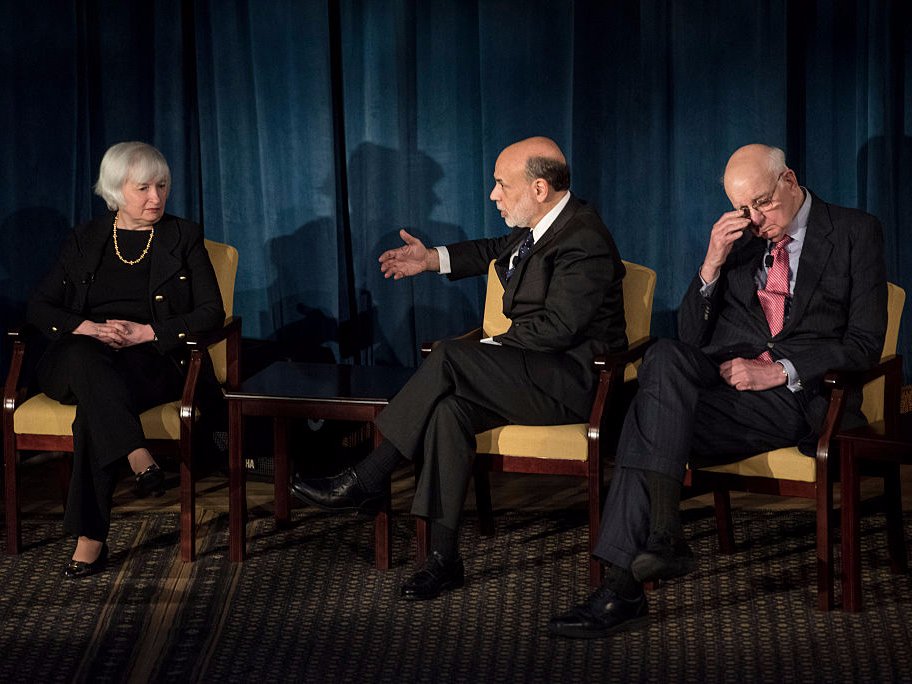 Former Federal Reserve Chair Ben Bernanke speaks during a conversation with Federal Reserve Chair Janet Yellen Bernanke and former Chair Paul A. Volcker April 7, 2016 in at the International House in New York City.Andrew Renneisen/Getty
Former Federal Reserve Chair Ben Bernanke speaks during a conversation with Federal Reserve Chair Janet Yellen Bernanke and former Chair Paul A. Volcker April 7, 2016 in at the International House in New York City.Andrew Renneisen/Getty
- President Donald Trump has left markets in suspense as he considers who to nominate as the next Fed chair.
- His pick is not as relevant as many are making it out to be because with a few exceptions,Fed chairs are not bigger than the institution they oversee, Gluskin Sheff’s David Rosenberg argues.
- The next chair will direct the huge task of slowly reversing the Fed’s accommodative policies without causing another recession.
The race for chair of the Federal Reserve is heating up.
Trump met with chair Janet Yellen on Thursday, solidifying prospects that she could be reappointed. Her four-year term ends next February. Meanwhile, betting odds at PredictIt placed Jerome Powell, a current Fed governor, in the lead on Friday; Politico reported Thursday that Trump was leaning heavily towards nominating him.
Although the Fed chair is influential, he or she joins 11 colleagues on the Federal Open Market Committee with wideranging views on monetary policy. And the chair has only one vote, noted David Rosenberg, the chief economist at Gluskin Sheff.
“The Fed is a democracy, not a dictatorship,” he told Business Insider. “This chatter and talk about who the next Fed chairman is is interesting, but I think it’s less relevant than a lot of other people do.”
Alan Greenspan is one example of a chairman who became bigger than the institution, Rosenberg said. But he was an exception.
“The most effective chairmen at the Fed have been the ones that have cobbled together a consensus,” Rosenberg said. “The last thing you want to do is come on board and think that you know the economy better than the Fed staff does and begin to try and push the Fed in a certain direction. It’s a very diverse group around the mahogany table.”
A political decision
Trump’s decision could come down to a person he believes would best further his economic agenda without undoing the last eight years of recovery.
It’s not an unusual deciding factor. But Trump’s value for loyalty makes it an even more political decision that could push him to break with the status quo.
Many of his predecessors did the opposite. Barack Obama nominated Ben Bernanke, who had been appointed by George W. Bush, for a second term in the wake of modern history’s worst financial crisis. In 1996, Bill Clinton renominated Greenspan, who leaned libertarian. And, Ronald Reagan reappointed Paul Volcker, a Democrat.
“It will be a mistake to rule Janet Yellen out,” Rosenberg said. Yellen has said she intends to serve out her full term and has not commented on her intentions beyond that.
“One of the challenges for President Trump is that he wants to have a low-rates chairman and a deregulation chairman rolled into one,” Rosenberg said. “But the problem is that the same candidates for the Fed’s chairmanship who are pro deregulations are the same ones that also want higher interst rates. So he’s going to have to somehow compromise, and it’s uncertain as to who it’s really going to be.”
 A Federal Open Market Committee meeting in the 1970s.Flickr / Federal Reserve
A Federal Open Market Committee meeting in the 1970s.Flickr / Federal Reserve
A whole new shift
Rosenberg added that markets and the economy coincidentally tend to take a major turn shortly after a new Fed chair is appointed.
Volcker steered the Fed through two recessions, the first starting within a year of his chairmanship. Black Monday in October 1987 occurred two months after Alan Greenspan took the helm. Ben Bernanke walked into a housing bubble that morphed into a financial crisis.
“I think that we’re not only going into potentially new leadership of the Fed, we’re also going into a whole new shift of the monetary policy regime of not just rising interest rates but shrinkage of the balance sheet, which is a new experiment as we run the movie backwards,” Rosenberg said.
“Also, keep in mind that we have likely rate hikes out of the UK and possible tapering out of the ECB. So monetary policy globally is going into a new chapter at a time when volatility measures could scarcely be lower and complacency levels could scarcely be higher.”
If Yellen is not reappointed, her departure together with former Fed Vice Chairman Stanley Fischer would remove nearly three decades of policy experience from the Fed, Rosenberg said.
“That tells me that if there’s going to be a bull market in anything in the coming year, it’s going to be in volatility.”













